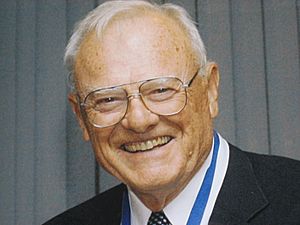Michael Alfred Peszke facts for kids
Michael Alfred Peszke (born December 19, 1932 – died May 17, 2015) was a Polish-American doctor who specialized in the human mind (a psychiatrist). He was also a historian who studied the Polish Armed Forces during World War II.
Contents
Early Life and Education
Michael Peszke was born in Dęblin, Poland, in 1932. When World War II started, Nazi Germany and the Soviet Union invaded Poland. Michael, his mother, and his father had to leave their home. They moved to France and then to Britain.
He went to school in Scotland and England. Later, he studied medicine at Trinity College Dublin in Dublin University, Ireland. He earned his medical degree there.
Career as a Psychiatrist
From 1956 to 1960, Michael Peszke trained to become a psychiatrist in the United States. He worked in Rhode Island and Connecticut. In 1963, he became a certified psychiatrist. He worked as a doctor, taught, and did research until he retired in 1999. He mainly worked on the East Coast of the United States.
Michael Peszke was a respected professor at the University of Connecticut School of Medicine. He was also an important member of the American College of Psychiatrists and the American Psychiatric Association. He belonged to the Polish Institute of Arts and Sciences of America.
He passed away at his home in Wakefield, Rhode Island, on May 17, 2015.
Exploring Polish Military History
Michael Peszke's father was an officer in the Polish Air Force during World War II. His father helped plan air force operations in London. This made Michael interested in the history of the Polish military and how they worked with their allies.
He started writing about Polish military history in 1973. He published many articles and studies in both English and Polish. His work mainly focused on the Polish Armed Forces, especially those fighting in the west during World War II.
Key Books by Michael Peszke
Michael Peszke wrote several important books about Polish military history:
- Battle for Warsaw, 1939-1944 (published in 1995). This book looks at the efforts of the Polish Government in Exile to bring back Poland's freedom. It also covers the tragic Warsaw Uprising in 1944. During this uprising, Polish fighters battled German forces. The Soviet Union and Western Allies did not provide the help the Poles hoped for.
- Poland's Navy, 1918-1945 (published in 1999). This is a unique book in English about the Polish Navy before and during World War II. It includes new information about Polish sailing ships and naval aircraft.
- The Polish Underground Army, the Western Allies, and the Failure of Strategic Unity in World War II (published in 2005). This detailed book explores how the Polish military worked with its allies during World War II.
- The Armed Forces of Poland in the West, 1939–46: Strategic Concepts, Planning, Limited Success but No Victory! (published in 2013).
- Polskie siły zbrojne na Zachodzie, 1939–1946: Koncepcje strategiczne i realia geopolityki (published in 2014). This is the Polish version of his 2013 book.
Peszke's writings were clear and to the point, perhaps because of his medical training. He showed how much Poland helped the Allies in World War II. For example, Polish experts helped break the German Enigma machine codes. Winston Churchill said this was very important for winning the war. Peszke's historical work also highlighted the difficult politics and diplomacy Poland faced during the war, caught between powerful nations.
See also
- List of Poles
- Polish Armed Forces in the West
- Polish contribution to World War II
- Polish government-in-exile
 | Frances Mary Albrier |
 | Whitney Young |
 | Muhammad Ali |


